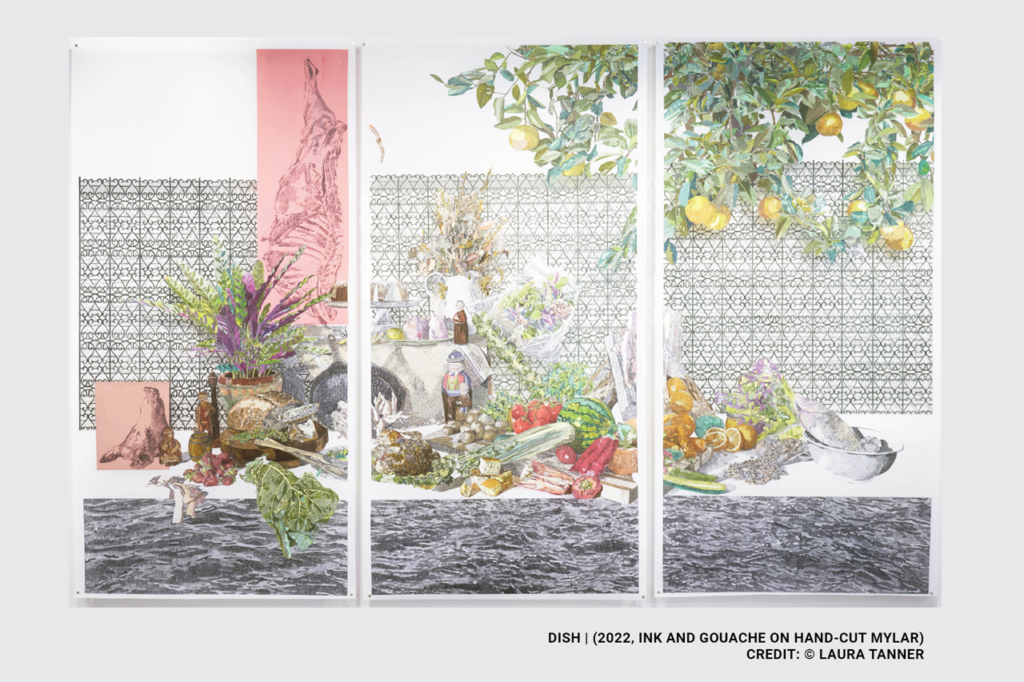By Lisa MacNamara, FAU Department of Visual Arts and Art History
Laura Tanner, an assistant professor of visual arts and art history at Florida Atlantic University, presented her current project “Dish” at the Fifth National Climate Assessment (NCA5) of the U.S. Global Change Research Program.
This program is a two-part congressionally mandated report with a mission to assess the science of climate change and variability and its impacts across the United States, in collaboration with the Smithsonian Institute, the National Oceanic and Atmospheric Administration, the National Science Foundation and the Federal Emergency Management Agency. Tanner’s project at NCA5 is part of Art x Climate, a gallery of 92 artworks that were chosen from among more than 800 submissions. She is one of only three artists that was asked to present at the meeting.
“The NCA5 gallery is the most viewed page of the final report, falling just behind the overview,” Tanner said. “This demonstrates the importance of including the humanities in major initiatives as an effective communications tool.”

In 2019, the exploration of the intersection of food, science and art led Tanner beyond the mere nutritional and traditional aspects of regional recipes, also questioning social implications surrounding the preparation and consumption of food, pondering questions like “who prepares the food and who is at the table.” This curiosity sparked the development of structured community engagements organizing gatherings for local residents, food providers and consumers to share stories about the preparation and presentation of classic regional recipes and food traditions, all centered around the communal table.
The recipes, anecdotes and photographic documentation of each event were archived and served as the basis for a series of drawings and a printed catalog, as well as an online archive. The catalog, modeled after community or Junior League cookbooks, aims to extend the dialogue sparked by these gatherings. It serves as a form of activism, raising awareness about local challenges and advocating for change beyond the dinner table. The idea was that through these shared stories one could start to understand the collective identity of regional communities and how those regional identities inform the national.
Tanner relies upon cross-disciplinary collaboration. Through engagement with scholars, food providers and non-profit organizations, it offers innovative pathways for artists to engage with and affect social change.
“Teaching interdisciplinary studio practice allows me to interact with student at both ends of their academic careers – freshman and graduate,” Tanner said. “I enjoy sharing the research methodologies that I learn with my students by allowing it to inform my curricular approach. Additionally, the relationships formed during each stage of this ongoing project often provide tangible resources for the students and the College of Arts and Letters.”
Tanner is currently working with the FAU Office of Research and Development to identify opportunities to collaborate with faculty members in other disciplines, particularly those located within the School of Environmental Sciences. FAU is a leader in research regarding the impact of climate change on coastal communities. She believes that she can contribute to FAU’s research by archiving and sharing stories from her project of the residents living in the regions that are most impacted.
Lisa MacNamara (MFA Studio Art, 2024) is a graduate teaching assistant in the Department of Visual Arts and Art History at FAU. This piece was originally published at https://www.fau.edu/artsandletters/news/tanner-nca5/.
Sign up for The Invading Sea newsletter by visiting here. If you are interested in submitting an opinion piece to The Invading Sea, email Editor Nathan Crabbe at ncrabbe@fau.edu.



